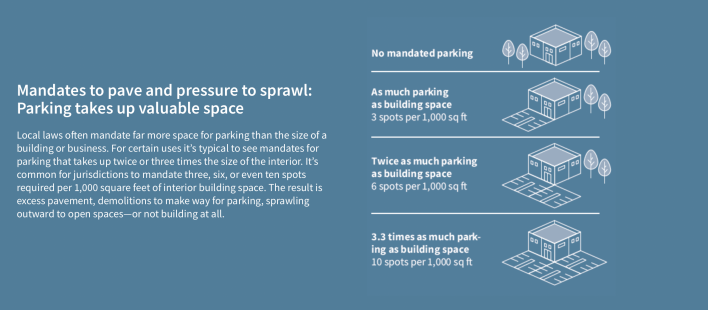A "nation-leading" bill could help one state solve its housing crisis using a powerful but overlooked tool: getting rid of rules that force developers to build expensive parking spaces that drivers don't even need.
Lawmakers in Washington State recently passed what advocates at the Sightline Institute are calling "one of the strongest parking reform packages attempted anywhere in the United States," barring cities with more than 30,000 residents from requiring excessive car storage outside homes, apartments, businesses, and other structures. Under the law, cities can only legally require the developers of apartment buildings to build one parking spot for every two units, and detached single family home-builders can only be compelled to build one.
Some building types are even held exempt from all parking requirements, including affordable and senior housing complexes where fewer residents drive, daycare centers that struggle to make ends meet even without an ocean of asphalt to build and maintain, and any residence under 1,200 square feet — a category which includes most apartments in dense areas like Seattle.
And in the process, Washington will streamline scores of largely arbitrary building codes that do things like require more than twice as many parking spots for mosques than churches, and set rigid standards for even the most arcane building uses, like "butterfly or moth breeding facilities" (one spot per 250 feet) and bowling alleys (five spots per lane).

Proponents of the bill say those subtle moves could have a seismic impact on Washington's housing and commercial landscape, allowing builders to unlock countless acres of previously undevelopable land that legally had to be devoted to asphalt — even if the structures those spaces serve were initially built in the days when parking minimums were lower.
That includes a notorious shopping mall in the capital city of Olympia, which would require mall owners to provide a whopping 4.5 spaces, or about 730 square feet, for every 1,000 square feet of interior floor area if they added any structure to the site today — meaning nearly as much land would go to car storage as it would to shopping, housing, and services.
"The city would love to redevelop this area and have it grow into a more walkable, mixed-use community, instead of this retail-only center," said Catie Gould, a senior transportation researcher for Sightline who also helped draft and advocate for the bill. "But you literally can't build a single building on the parking lot with the parking minimum so high. ... Having the flexibility on both the housing and the commercial side is really helpful for doing more things with the space that we have."
In addition to the long-term benefits of unleashing more housing development, Gould says Washington's bill could offer renters immediate relief by encouraging landlords to start thinking of parking as a limited commodity they can lease out to those who really want spaces — and give anyone who doesn't a break on their rent, rather than essentially forcing them to subsidize their neighbor's asphalt.
Washington is one step closer to passing what would still be the most ambitious state-level parking reform bill - a big win for housing and a better transportation system. Exciting - and I hope other states are paying attention!
— Jesse Piedfort (@jessepiedfort.bsky.social) 2025-03-22T21:38:55.652Z
And over time, that simple mindset shift can lead to radically less car-centric communities — and huge benefits for local economies. Sightline says members of the business community were among the strongest supporters of Washington's bill, because they recognize parking minimums as "a tax on businesses that limit opportunities for new establishments, expansions of successful businesses, conversions of historic buildings, and other uses."
"[Parking reform] allows the market to build what they think is common sense, instead of having these predetermined rules that were set by the government who knows how many decades ago — and [who knows where] these numbers even originated from in the first place," added Gould. "It really does re-legalize the basic building blocks of being able to build a walkable city again, which is not possible if all your buildings are surrounded by parking lots that are two times as large as the buildings are."
Gould acknowledged there's more work to be done on Washington's beyond this bill, which probably won't be in full force for at least 18 months since Gov. Bob Ferguson still needs to sign it.
For instance, the legislation doesn't cover cities with fewer than 30,000 residents, which represents about one-quarter of the state — a carveout which she says is a shame, because "small towns need parking reform, too." It also doesn't touch thorny issues like how to price and manage street parking, with which she argues virtually no city has adequately contended.
Still, Gould suspects that Washington will continue to build on its parking reform success — and other states might soon go even further by passing full-scale repeals of all mandatory minimums. In 2023 alone, more than a dozen US states proposed bills to limit or reduce parking minimums — many of which are still making their way through the legal process — and the American Planning Association recently found that 83 cities and three counties across the country have already adopted substantial reforms.
Support for those changes is also defying typical party lines, with Republicans in her state crossing the aisle to vote with Democrats, and even deep-red states like Montana passing similar legislation.
"The housing crisis is an issue in every single community," Gould added. "All legislators hear about this, no matter where they are ... I think the politics of this problem are moving pretty quickly as more people are aware of these rules — and what the actual impacts are to their communities."






